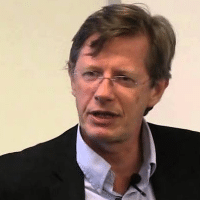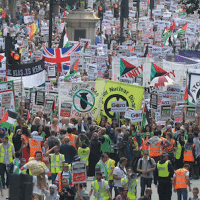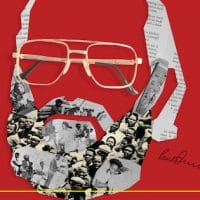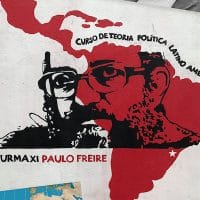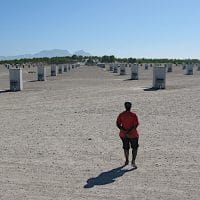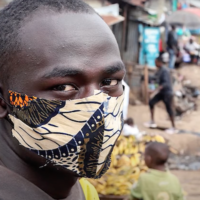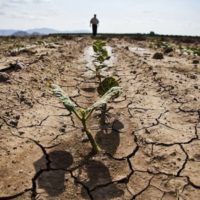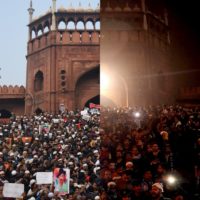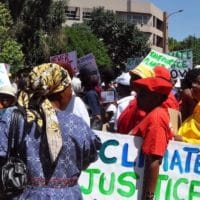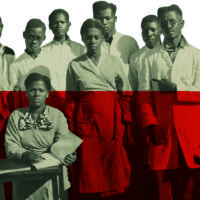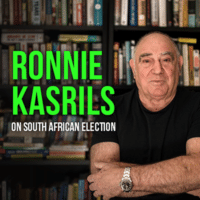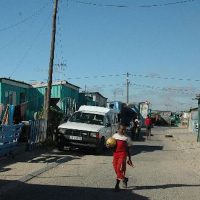-
As South African climate justice veterans fall, consciousness begins reviving, from below and across
On three days last week–December 23-25–South Africa’s east coast province of KwaZulu-Natal (KZN) lost three of its clearest voices for social justice and environmental sanity: rural women’s leader Sizani Ngubane (74), trade unionist Patrick Mkhize (60) and progressive activist Faith ka-Manzi (52).
-
Against the witch-hunt
Veteran of the fight against Apartheid RONNIE KASRILS warns that the IHRA is being used to suppress left-wing supporters of Palestine, just as anti-communist hysteria was used against the national-liberation movement in South Africa
-
It is freedom, only freedom which can quench our thirst
In the 1980s, after Mozambique won its independence from Portugal in 1974, the South African apartheid regime and the settler-colonial army of Rhodesia backed an anti-communist faction against the government of the Mozambique Liberation Front (FRELIMO).
-
Dossier 34: Paulo Freire and popular struggle in South Africa
He constantly experimented with and thought about how to connect learning and teaching among the poor and oppressed with the radical transformation of society.
-
Medical workers of conviction: Speaking to Cuban doctors who heal the world
The United States government has continued attacking Cuban medical internationalism right up to the current pandemic, making wild allegations against the program that disparage the medical workers.
-
Dossier 31: ‘The Politic of Blood’: Political Repression in South Africa
In his famous speech from the dock in April 1964, Nelson Mandela spoke of ‘revolutionary democracy’ rooted in precolonial forms of collective deliberation and decision making.
-
Another life-saving brigade travels to South Africa
More than 1,450 men and women in white lab coats from Cuba’s Henry Reeve Contingent have traveled to 22 nations in Europe, Latin America and the Caribbean, Africa and the Middle East to battle the pandemic.
-
“Capitalism is incapable of responding to a crisis of this kind”
The lockdown in South Africa has been extended till the end of April. However, the government’s execution of the lockdown, along with decades of under-investment in health, has left the country unprepared.
-
Catastrophe is upon us–the grim view from Southern Africa
The word catastrophe is being used more and more by institutions reporting on the effects of extreme weather in the two regions of Africa, Southern and South Eastern Africa, and of late Australia. The word means a number of things: tragic; fiasco; utter failure; sudden and violent change in a feature of the Earth. All are completely fitting for the situation we now face.
-
Dossier 24: The world oscillates between crises and protests
This dossier is dedicated to offering an assessment of the moment we find ourselves in today. Part 1 provides a quick overview of planetary affairs; and Part 2 there are more detailed reports from our offices on their respective regions: South Africa, India, as well as the Caribbean and Latin America.
-
Working Document 2: The fate of Xolobeni would be the fate of us all
Since 1996, activists in Xolobeni, a coastal region in South Africa, have been fighting a foreign mining conglomerate that learned that their ancestral lands happen to be rich in titanium. The anti-mining activists of Xolobeni, who have lost many comrades to hit squads, continue to struggle against this foreign company and its partners in the South African government. Given that their land is located in a global biodiversity hotspot, their struggle is the struggle of us all: it is the fight for water, soil, food, and air.
-
Towards a working-class environmentalism for South Africa
It’s going take a fully democratic anti-capitalist movement to fight climate change. The case of South Africa shows how long we have to go.
-
Dossier no. 20: When you ill-treat the African people, i see you
The Industrial & Commercial Workers’ Union (ICU)—a trade union, rural peasant movement, and urban squatters’ movement—formed on the docks in Cape Town in 1919. Within a decade, the ICU had expanded across Southern Africa without regard for national borders and counted people from various African countries and the Caribbean in its leadership, as well as people who were Indian and mixed race. The largely forgotten history of the ICU is well worth recovering in a time of escalating chauvinism and xenophobia. Our Dossier #20 offers an introduction to this extraordinary popular movement.
-
Ronnie Kasrils on South African election
As the curate said, assessing a none-too-fresh boiled egg at breakfast: ‘It was good in parts.’
-
We have stolen his land. Now we must steal his limb
When the late South African artist Tito Zungu wanted to depict the world of the migrant labourer, he settled on the envelope. It was by infrequent letters that the migrant would be able to be in touch with family – letters dictated to professional letter writers at one end, which would be read out by professional letter readers at the other.
-
Dossier 16: Resource sovereignty—the Agenda for Africa’s exit from the state of plunder
In this interview Gyekye Tanoh, head of the Political Economy Unit at the Third World Network-Africa based in Accra (Ghana), elaborates upon the themes of corporate plunder, resource nationalism and people-centered forms of resource management in Africa.
-
From the BRICS countries to the townships: racial and social segregation continues
Over 25 years ago now the people of South Africa won the struggle to end the Apartheid regime. Nevertheless, even though it is now against the law, de facto racial segregation is still apparent.
-
Dossier 11: The homemade politics of Abahlali BaseMjondolo, South Africa’s shack dweller movement
The shack-dwellers’ movement– Abahlali baseMjondolo, or AbM— is among the organizations of the world’s poor and dispossessed fighting for land reform and dignity. Despite waves of repression by the state, AbM membership now numbers over 50,000 in settlements across the country since their founding in 2006. In an interview with Tricontinental Institute, Zikode talks about the essence of AbM—what they are fighting for, who they are, what they have achieved, and what we can learn from them.
-
The most potent weapon in the hands of the oppressor is the mind of the oppressed
Mike Peters explores the legacy of Steve Biko, a radical who spent his life fighting for Black liberation and for the overthrow of the Apartheid government in South Africa.
-
“We need new revolutionary tools to advance the struggle of the working class”
To this day, “NUMSA has not deviated from its perspective of Marxism, Leninism and its goal of building a socialist South Africa,” says Karl Cloete

